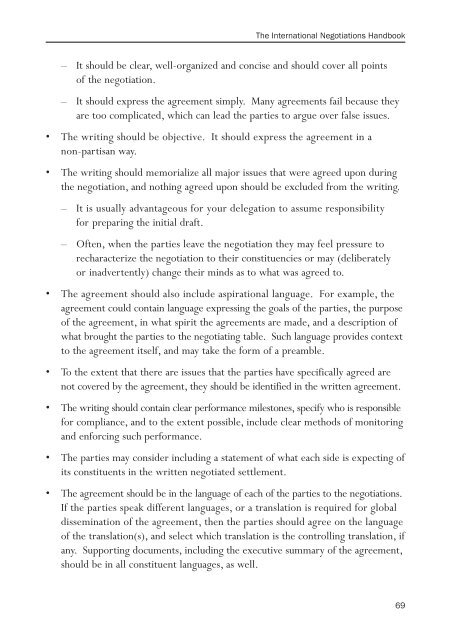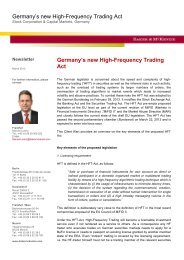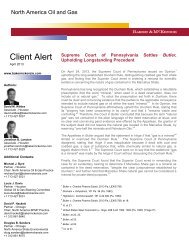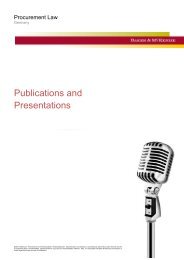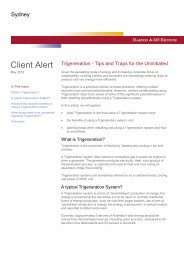The International Negotiations Handbook - Baker & McKenzie
The International Negotiations Handbook - Baker & McKenzie
The International Negotiations Handbook - Baker & McKenzie
Create successful ePaper yourself
Turn your PDF publications into a flip-book with our unique Google optimized e-Paper software.
<strong>The</strong> <strong>International</strong> <strong>Negotiations</strong> <strong>Handbook</strong><br />
– It should be clear, well-organized and concise and should cover all points<br />
of the negotiation.<br />
– It should express the agreement simply. Many agreements fail because they<br />
are too complicated, which can lead the parties to argue over false issues.<br />
• <strong>The</strong> writing should be objective. It should express the agreement in a<br />
non-partisan way.<br />
• <strong>The</strong> writing should memorialize all major issues that were agreed upon during<br />
the negotiation, and nothing agreed upon should be excluded from the writing.<br />
– It is usually advantageous for your delegation to assume responsibility<br />
for preparing the initial draft.<br />
– Often, when the parties leave the negotiation they may feel pressure to<br />
recharacterize the negotiation to their constituencies or may (deliberately<br />
or inadvertently) change their minds as to what was agreed to.<br />
• <strong>The</strong> agreement should also include aspirational language. For example, the<br />
agreement could contain language expressing the goals of the parties, the purpose<br />
of the agreement, in what spirit the agreements are made, and a description of<br />
what brought the parties to the negotiating table. Such language provides context<br />
to the agreement itself, and may take the form of a preamble.<br />
• To the extent that there are issues that the parties have specifically agreed are<br />
not covered by the agreement, they should be identified in the written agreement.<br />
• <strong>The</strong> writing should contain clear performance milestones, specify who is responsible<br />
for compliance, and to the extent possible, include clear methods of monitoring<br />
and enforcing such performance.<br />
• <strong>The</strong> parties may consider including a statement of what each side is expecting of<br />
its constituents in the written negotiated settlement.<br />
• <strong>The</strong> agreement should be in the language of each of the parties to the negotiations.<br />
If the parties speak different languages, or a translation is required for global<br />
dissemination of the agreement, then the parties should agree on the language<br />
of the translation(s), and select which translation is the controlling translation, if<br />
any. Supporting documents, including the executive summary of the agreement,<br />
should be in all constituent languages, as well.<br />
69


